I'm seeking feedback as to whether there's a more efficient approach than what I'm doing in my code shown at the bottom.
Basically, given this map:
Set<String> A_Set = new HashSet<>(Arrays.asList("1111", "2222", "5555"));
Set<String> B_Set = new HashSet<>(Arrays.asList("3333", "4444"));
Set<String> C_Set = new HashSet<>(Arrays.asList("6666"));
Set<String> D_Set = new HashSet<>(Arrays.asList("2222", "5555", "6666"));
Map<String, Set<String>> values = new HashMap<>();
values.put("A", A_Set);
values.put("B", B_Set);
values.put("C", C_Set);
values.put("D", D_Set);
which looks like this:
How do I create a Map<String, List<Boolean> map such that it looks like this:
In the most efficient way possible. My real Map has thousands of values per Set, but there are only ever 4 Sets (A, B, C, D).
Here's my current code. Can you think of a more efficient approach?
import java.util.*;
public class MapToMap {
public static void main(String[] args) {
Set<String> A_Set = new HashSet<>(Arrays.asList("1111", "2222", "5555"));
Set<String> B_Set = new HashSet<>(Arrays.asList("3333", "4444"));
Set<String> C_Set = new HashSet<>(Arrays.asList("6666"));
Set<String> D_Set = new HashSet<>(Arrays.asList("2222", "5555", "6666"));
Map<String, Set<String>> values = new HashMap<>();
values.put("A", A_Set);
values.put("B", B_Set);
values.put("C", C_Set);
values.put("D", D_Set);
Map<String, List<Boolean>> exists = new HashMap<>();
for (Map.Entry<String, Set<String>> v : values.entrySet()) {
for (String val : v.getValue()) {
if (exists.containsKey(val)) {
List<Boolean> list = exists.get(val);
list = addValue(v.getKey(), list);
exists.put(val, list);
} else {
List<Boolean> newList = new ArrayList<>(Arrays.asList(false, false, false, false));
newList = addValue(v.getKey(), newList);
exists.put(val, newList);
}
}
}
for (Map.Entry<String, List<Boolean>> s : exists.entrySet()) {
System.out.println(s);
}
}
private static List<Boolean> addValue(String key, List<Boolean> listToUse) {
List<Boolean> newList = new ArrayList<>();
if (Objects.equals("A", key)) {
newList.addAll(Arrays.asList(true, listToUse.get(1), listToUse.get(2), listToUse.get(3)));
} else if (Objects.equals("B", key)) {
newList.addAll(Arrays.asList(listToUse.get(0), true, listToUse.get(2), listToUse.get(3)));
} else if (Objects.equals("C", key)) {
newList.addAll(Arrays.asList(listToUse.get(0), listToUse.get(1), true, listToUse.get(3)));
} else if (Objects.equals("D", key)) {
newList.addAll(Arrays.asList(listToUse.get(0), listToUse.get(1), listToUse.get(2), true));
}
return newList;
}
}

